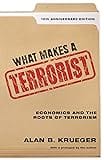What Makes a Terrorist
Published:
What Makes a Terrorist

Metadata
- Author: Alan B. Krueger
- Full Title: What Makes a Terrorist
- Category: #books
Highlights
- The most newsworthy conclusion of What Makes a Terrorist was that terrorists do not tend to come from underprivileged, impoverished backgrounds. Instead, terrorists—especially international terrorists—tend to be drawn from the ranks of the relatively advantaged in the societies from which they come, in terms of family income, occupational opportunities, and education. (Location 66)
- I argued in What Makes a Terrorist that both supply and demand factors push terrorists to be drawn from the ranks of the well off and well educated. On the supply side, as mentioned, educated people are more likely to hold stronger political views and seek to influence geopolitical events. On the demand side, terrorist groups screen terrorists and often select the elite to carry out their despicable acts to reduce their likelihood of being detected and raise their odds of success, particularly for high-value targets (Benmelech and Berrebi, 2007). (Location 101)
- The victims of terrorist attacks, by contrast, are much more likely to come from wealthy countries than poor countries. The same pattern applies to the targets of suicide attacks, although the perpetrators of suicide attacks are also more likely to originate from wealthier countries. (Location 1960)
- My research shows that civil liberties are an important determinant of terrorism. It is possible that there are some indirect links between economic conditions and civil liberties. Wealthier countries are more likely to protect their residents’ civil liberties and political freedoms, so extremists in these countries might be less inclined to turn to terrorism to pursue their agendas. (Location 2202)
- The data tell us that terrorism should be viewed more as a violent political act than as a response to economic conditions. Education and poverty probably have little to do with terrorism. There are many reasons for improving education and reducing poverty around the world, but reducing terrorism is probably not one of them. (Location 2205)
- Tags: pink
public: true
title: What Makes a Terrorist longtitle: What Makes a Terrorist author: Alan B. Krueger url: , source: kindle last_highlight: 2019-12-12 type: books tags:
What Makes a Terrorist

Metadata
- Author: Alan B. Krueger
- Full Title: What Makes a Terrorist
- Category: #books
Highlights
- The most newsworthy conclusion of What Makes a Terrorist was that terrorists do not tend to come from underprivileged, impoverished backgrounds. Instead, terrorists—especially international terrorists—tend to be drawn from the ranks of the relatively advantaged in the societies from which they come, in terms of family income, occupational opportunities, and education. (Location 66)
- I argued in What Makes a Terrorist that both supply and demand factors push terrorists to be drawn from the ranks of the well off and well educated. On the supply side, as mentioned, educated people are more likely to hold stronger political views and seek to influence geopolitical events. On the demand side, terrorist groups screen terrorists and often select the elite to carry out their despicable acts to reduce their likelihood of being detected and raise their odds of success, particularly for high-value targets (Benmelech and Berrebi, 2007). (Location 101)
- The victims of terrorist attacks, by contrast, are much more likely to come from wealthy countries than poor countries. The same pattern applies to the targets of suicide attacks, although the perpetrators of suicide attacks are also more likely to originate from wealthier countries. (Location 1960)
- My research shows that civil liberties are an important determinant of terrorism. It is possible that there are some indirect links between economic conditions and civil liberties. Wealthier countries are more likely to protect their residents’ civil liberties and political freedoms, so extremists in these countries might be less inclined to turn to terrorism to pursue their agendas. (Location 2202)
- The data tell us that terrorism should be viewed more as a violent political act than as a response to economic conditions. Education and poverty probably have little to do with terrorism. There are many reasons for improving education and reducing poverty around the world, but reducing terrorism is probably not one of them. (Location 2205)
- Tags: pink